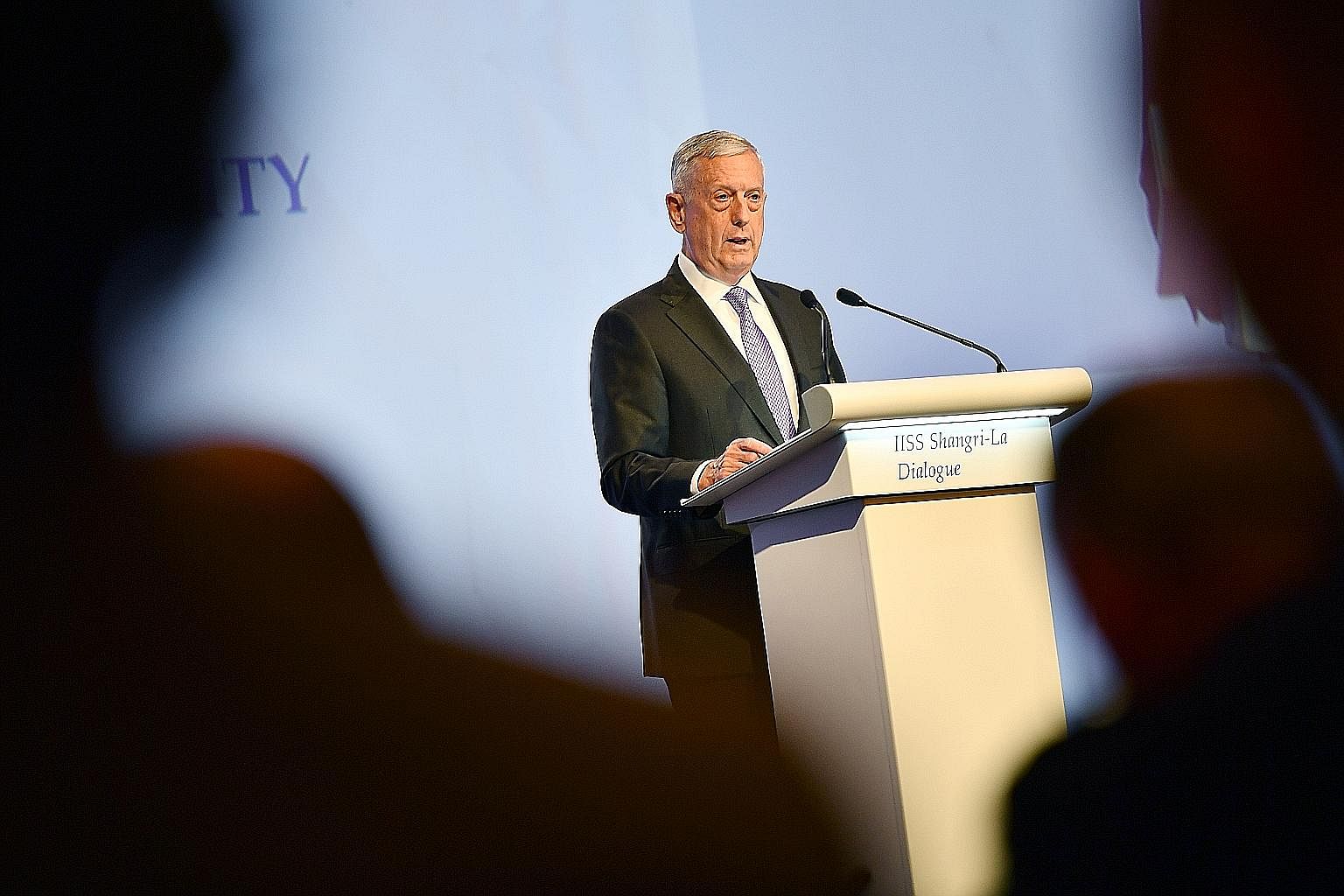If United States Defence Secretary James Mattis' mission in Asia was to restore confidence in his country's commitment to the region, then he has not succeeded fully.
While his words have been welcomed, questions remain: Would his rhetoric be matched with action? Does what he said represent the views of President Donald Trump or those of the old Washington establishment?
Some participants who heard his speech at the IISS Shangri-La Dialogue security summit did not find a clear articulation of US policy towards the region and did not see any concrete ways to advance US engagement with the region.
Mr Mattis' reassurance last Saturday was important, coming soon after Mr Trump announced the US withdrawal from the Paris climate change accord.
This move and the January pullout from the Trans-Pacific Partnership trade deal, the economic cornerstone of his predecessor Barack Obama's pivot to Asia, had led to anxieties among countries that see the US as a counterweight to China's growing influence in the region.
In his speech, Mr Mattis assured countries of America's enduring commitment to the region's security and prosperity.
"The United States will continue to adapt and continue to expand its ability to work with others to secure a peaceful, prosperous and free Asia," he said, adding that "we stand with our allies, partners and the international community to address pressing security challenges together".

To questions, including whether Mr Trump could be trusted, given his "America first" policy, Mr Mattis said: "We will still be there. We will be there with you."
His words drew positive responses from some of the defence ministers present.
Japanese Defence Minister Tomomi Inada said she placed "full trust" in the US. Her sentiment was shared by her Australian counterpart Marise Payne, who pointed out that the first countries visited by the Defence Secretary were Japan and South Korea.
Singapore Defence Minister Ng Eng Hen told the media that Asean countries "strongly supported Secretary Mattis' affirmation of continued US presence in the region" at a meeting between Mr Mattis and his Asean counterparts yesterday.
Still, there were those who came away unpersuaded.
Said Malaysian Defence Minister Hishammuddin Hussein: "I would like to know very clearly what the true intentions of the new administration are."
Another delegate who would have liked greater clarity in Mr Mattis' pronouncements was Dr Lynn Kuok, a senior visiting research fellow with the Centre for International Law at the National University of Singapore.
"I would have liked Secretary Mattis to say unequivocally, as the former administration did, that the United States has top national interests in the South China Sea and that defence of its interests in the South China Sea would not be sacrificed at the altar of its interest, say, in getting cooperation from China on North Korea," she said.
Washington has sought China's cooperation to rein in North Korea's nuclear and missile development programmes, which to the US pose a "clear and present danger" to the US and the world.
In his speech, Mr Mattis said the US would not allow "unilateral, coercive changes to the status quo" in the South China Sea, alluding to China's island-building activities in disputed areas of the waters and the militarising of these islands.
However, Mr Mattis sidestepped Dr Kuok's question about how this might be carried out.
For Dr Tang Siew Mun, who heads the Asean Studies Centre, Mr Mattis disappointed by not offering concrete ways to engage the region, such as in the area of cyber security or the upgrading of Cobra Gold, the largest Asia-Pacific military exercise, held in Thailand annually.
Instead, Mr Mattis spoke broadly about strengthening America's alliances in the region and the moving of military assets to the region.
What was also disappointing, said Professor Huang Jing of the Lee Kuan Yew School of Public Policy, was the lack of a policy framework in Mr Mattis' utterances.
"That is quite worrisome because we know that the US, as a dominant power in the region, can do a lot of things, but all these have to be consistent and have to be under one strategy."
Moreover, it is unclear how much of what Mr Mattis said was shared by Mr Trump or represented the views of the Washington establishment, said Prof Huang.
Overall, he was not convinced that the US would put the money where its mouth is.
So what can be done to ensure that the US stays engaged in Asia?
Professor Tosh Minohara of Kobe University suggested that countries in the region should "convince Mr Trump of the importance of being interested in the region".
Additional reporting by Danson Cheong

